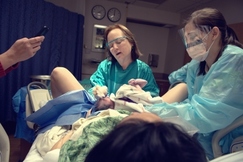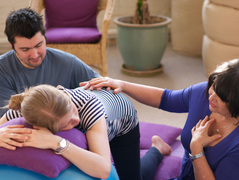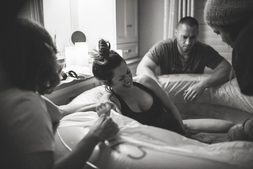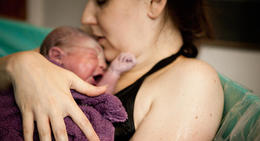What is 'Normal' Birth?
The Debate

There is a really interesting debate going on amongst midwives and birth supporters at the moment, asking what is the right word or phrase to describe ‘normal’ birth? But before we can answer that, we have to ask, well, just what is a normal birth?
What is normal for one woman may not be normal for another. Does normal mean natural? Is natural everyone’s normal? Can a caesarean ever be classed as normal? And what about the entire spectrum of different birth experiences in between? Just how should we classify what is normal?
This was the question posed by midwife Sheena Byrom OBE who set up a twitter debate to ask ‘what word should we use to define vaginal birth without intervention?’ The key concern at the heart of the discussion is the question “ if we use the word normal, will that promote disappointment in women who will then feel that they ‘failed’ to achieve a normal birth if they did need some intervention help to deliver their baby?”
In reading through the debate responses, the shining factor that kept coming up was the recognition that it is the birth EXPERIENCE that is most important, not HOW the baby was birthed.
My favourite comment in reading the transcript was "would we ask, did you have a normal baby? Then why ask, did you have a normal birth??"
What is normal for one woman may not be normal for another. Does normal mean natural? Is natural everyone’s normal? Can a caesarean ever be classed as normal? And what about the entire spectrum of different birth experiences in between? Just how should we classify what is normal?
This was the question posed by midwife Sheena Byrom OBE who set up a twitter debate to ask ‘what word should we use to define vaginal birth without intervention?’ The key concern at the heart of the discussion is the question “ if we use the word normal, will that promote disappointment in women who will then feel that they ‘failed’ to achieve a normal birth if they did need some intervention help to deliver their baby?”
In reading through the debate responses, the shining factor that kept coming up was the recognition that it is the birth EXPERIENCE that is most important, not HOW the baby was birthed.
My favourite comment in reading the transcript was "would we ask, did you have a normal baby? Then why ask, did you have a normal birth??"
Normal Physiologic Birth

The phrase which I was taught when I trained with Michel Odent was the idea that every woman has a capacity for ‘normal physiologic birth’.
What I have always appreciated about this description is that I feel it encapsulates the fact that every woman is different, and that what is normal for her is completely unique to her physiology, to the size and shape of her pelvis and her pelvic outlet, to the size and shape of her baby, according to what position that baby is in according to the space and place where she is giving birth, according to the trust or fear she may be experiencing, according to, according to, according to…
All the factors that affect birthing women are a complex of both internal and external influences that are driving what is a much heightened hormonally-mastered physiologic experience. It seems to me that it should not matter so much what happens in respect the various ways she may be helped in birthing that baby, BUT, it matters in a most crucial way HOW that help is given.
What I have always appreciated about this description is that I feel it encapsulates the fact that every woman is different, and that what is normal for her is completely unique to her physiology, to the size and shape of her pelvis and her pelvic outlet, to the size and shape of her baby, according to what position that baby is in according to the space and place where she is giving birth, according to the trust or fear she may be experiencing, according to, according to, according to…
All the factors that affect birthing women are a complex of both internal and external influences that are driving what is a much heightened hormonally-mastered physiologic experience. It seems to me that it should not matter so much what happens in respect the various ways she may be helped in birthing that baby, BUT, it matters in a most crucial way HOW that help is given.
The Culture Clash of 'Safe Practice' and Intuitive Birthing

We live in a culture where the current maternity services are geared to try and ensure the safest possible outcome, so there is a structure of policies, protocols and procedures that are there to help guideline safe practice.
Add to this the fact that we do have a midwifery crisis, and that many of the hospital maternity units are both understaffed and overcrowded, working at far beyond the capacity they were originally built for. This imposition on resources is part of the picture of why we see a significant proportion of intervention labours.
Our modern women are also at their capacity, often working right up into late pregnancy, often coming into their labours without much reserve energy, often feeling concerned or fearful, which has a dynamic influence on the chemistry of their labouring hormones, sometimes to the point of inhibiting the labour's onset or progress. This too is part of the picture of why we see a significant proportion of intervention labours.
For women to labour well, to be able to drop into their intuitive and connected POWER to birth, they must first and foremost feel SAFE.
The unfortunate 'clash' that our safe practice culture has engendered is that many women are approaching labour with fear and trepidition, not confident in their own ability to birth well, and not necessarily confident that the services will serve them.
This is not a criticism of the maternity care force of great people doing their best to do their jobs in truly challenging circumstances - but - it is a comment to question how much the undermining of trust has pervaded, to the point that many women feel afraid that they may become one of the 35-40% of women who feel they have had a 'bad' birth experience.
Add to this the fact that we do have a midwifery crisis, and that many of the hospital maternity units are both understaffed and overcrowded, working at far beyond the capacity they were originally built for. This imposition on resources is part of the picture of why we see a significant proportion of intervention labours.
Our modern women are also at their capacity, often working right up into late pregnancy, often coming into their labours without much reserve energy, often feeling concerned or fearful, which has a dynamic influence on the chemistry of their labouring hormones, sometimes to the point of inhibiting the labour's onset or progress. This too is part of the picture of why we see a significant proportion of intervention labours.
For women to labour well, to be able to drop into their intuitive and connected POWER to birth, they must first and foremost feel SAFE.
The unfortunate 'clash' that our safe practice culture has engendered is that many women are approaching labour with fear and trepidition, not confident in their own ability to birth well, and not necessarily confident that the services will serve them.
This is not a criticism of the maternity care force of great people doing their best to do their jobs in truly challenging circumstances - but - it is a comment to question how much the undermining of trust has pervaded, to the point that many women feel afraid that they may become one of the 35-40% of women who feel they have had a 'bad' birth experience.
The Tyranny of 'Natural'

It is fair to say that in our current birthing culture there is a (predominantly middle class) attitude that if you have not had a 'natural' birth that somehow you have failed, and that if you are not successfully breastfeeding that somehow you have failed.
Time and Time and Time again, in my role with Birth Crisis Helpline, I have listened to women castigating themselves because they needed interventions thus deeming to themselves that somehow their labour was NOT natural.
Time and time again I have worked with women to debrief their labour experience only to deconstruct that they are caught in quagmire of negative emotions, of anger, fear, guilt and shame, because somehow they feel they have let themselves, and their baby, down.
We have landed in a confusion of applying words like 'normal' and 'natural' without allowing the recognition that any help to birth our babies is help worth having.
I believe that on a deeply essential and subconcious level what this really means is that they wish to come in to the core place that is a normal part of birthing; that moment whereby they are handed their baby and in that first moment they will experience a rush of such pure love and joy quickly followed by a huge surge of triumph.
This is the most natural moment of a labour.
Time and Time and Time again, in my role with Birth Crisis Helpline, I have listened to women castigating themselves because they needed interventions thus deeming to themselves that somehow their labour was NOT natural.
Time and time again I have worked with women to debrief their labour experience only to deconstruct that they are caught in quagmire of negative emotions, of anger, fear, guilt and shame, because somehow they feel they have let themselves, and their baby, down.
We have landed in a confusion of applying words like 'normal' and 'natural' without allowing the recognition that any help to birth our babies is help worth having.
I believe that on a deeply essential and subconcious level what this really means is that they wish to come in to the core place that is a normal part of birthing; that moment whereby they are handed their baby and in that first moment they will experience a rush of such pure love and joy quickly followed by a huge surge of triumph.
This is the most natural moment of a labour.
No matter HOW your baby is birthed,
the moment you reach out
to bring that child into your loving embrace IS the most normal thing in the world,
this IS the most natural moment of motherhood.
the moment you reach out
to bring that child into your loving embrace IS the most normal thing in the world,
this IS the most natural moment of motherhood.
Your Way is the Right Way

I believe that what makes a birth both natural and normal is to reach this place of feeling this absolute sense of achievement, of accomplishment, a triumph of having endured the arduous process of birthing, and to have emerged with that precious wee babe in your arms.
It matters not what avenues that may need to take, what matters is that at each stage of the labour, from one step to the next, you are making decisions and choices that you feel confident are the right way for your baby to be born.
When this happens we are empowered with the control over our birthing decisions. This is the process that will take you to that most natural and normal of places, whereby you feel that your birth was the right kind of birth for you.
We need to work together as a culture, as birthing parents and as birth providers and as birth supporters, to change this either/or attitude. We need to stop debating as to whether an intervention is normal or not, and instead let us all focus on helping parents to have birthing experiences that will bring that rush of joy and triumph.
Knowing that your child is safely delivered (no matter HOW that delivery was facilitated) and that you have been heroic in the attempt to bring this baby forth is the process that brings us that entitled sense of acheivement.
It matters not what avenues that may need to take, what matters is that at each stage of the labour, from one step to the next, you are making decisions and choices that you feel confident are the right way for your baby to be born.
When this happens we are empowered with the control over our birthing decisions. This is the process that will take you to that most natural and normal of places, whereby you feel that your birth was the right kind of birth for you.
We need to work together as a culture, as birthing parents and as birth providers and as birth supporters, to change this either/or attitude. We need to stop debating as to whether an intervention is normal or not, and instead let us all focus on helping parents to have birthing experiences that will bring that rush of joy and triumph.
Knowing that your child is safely delivered (no matter HOW that delivery was facilitated) and that you have been heroic in the attempt to bring this baby forth is the process that brings us that entitled sense of acheivement.
I do not wish to in any way diminish the fact that many women are not experiencing this surge of triumph. We need to look carefully at how our maternity services are providing care and reflect on the myriad of ways that it is not being as well managed as it could and should be. It is consistently heartening to be aware that there is dissatisfaction about care provision from within the midwifery community, and please know that a great many wonderful midwives are doing their very best to help improve the current culture.
We also need though to look at the expectation of mothers and fathers approaching birth, and help to find a way forward out of this either/or language and come to a place where we can begin to realise that a normal birth experience is whatever it may be that your particular physiology requires, and that the most natural part of a labour is that moment when you first hold your child.
We also need though to look at the expectation of mothers and fathers approaching birth, and help to find a way forward out of this either/or language and come to a place where we can begin to realise that a normal birth experience is whatever it may be that your particular physiology requires, and that the most natural part of a labour is that moment when you first hold your child.


